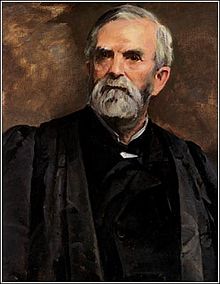Get Today in Masonic History into your Inbox. Sign up today for one of our email lists!
Need an article for your Trestleboard/Newsletter see our Use Policy
William Burnham Woods is Born

Today in Masonic History William Burnham Woods is born in 1824.
William Burnham Woods was an American jurist and Civil War general.
Woods was born in Newark, Ohio on August 3rd, 1824. He first attended Western Reserve University, now Case Western Reserve University, in Cleveland Ohio. He later transferred to Yale University where he received a Bachelor of Arts with honors. After graduating he returned home and read law for two years. He was admitted to the bar in 1847 and started to practice law with his mentor until 1862.
In 1856, Woods elected mayor of Newark. In 1858 he was elected to the Ohio General Assembly where he became Speaker of the House. He was elected to both positions as staunch Democrat.
Woods opposed slavery and the Civil War. This created a conflict for him until he finally realized a Union victory in the Civil War was a necessity to end slavery. In 1862 he joined the Army and became a lieutenant colonel in the 76th Ohio Infantry. He fought in the battles of Shiloh and Vicksburg before being promoted to brigadier general. He commanded a units under General Sherman during the Atlanta campaign and during Sherman's march to the sea. Before the war was over he was promoted to a brevet major general. He left the Army in 1866.
After leaving the Army, Woods took up residence in Mobile, Alabama for a year where he opened a law practice. He then moved to Montgomery, Alabama to continue his law practice and to be a cotton farmer.
In 1869, President Ulysses S. Grant appointed Woods to the United States Circuit Court for the Fifth Circuit. This was a newly created position and Woods was first appointee to the position. The most critical cases he oversaw on the court was the so called Slaughter House Cases, the cases revolved around the new 14th Amendment. At the time Woods interpreted the 14th Amendment very broadly and decided the monopoly held by the slaughter houses constituted a violation of the Privileges and Immunities clause of the Amendment. This was later be overturned by the United States Supreme Court.
In 1880, Woods, now a Republican was nominated by President Rutherford B. Hayes to be an associate justice on the United States Supreme Court. This made him the first Supreme Court Justice to be appointed to the Court after the Civil War. Two factors went into his approval. First he was a Republican and at the time the Republican's controlled the Senate. The other, he was born in the north and fought for the Union Army. In his time on the Supreme Court Woods was not a major contributor to the court.
Woods served on the Supreme Court until the time of his passing on May 14th, 1887.
Woods was a member of Newark Lodge No. 69 (renumbered to 97) in Newark, Ohio.
This article provided by Brother Eric C. Steele.

